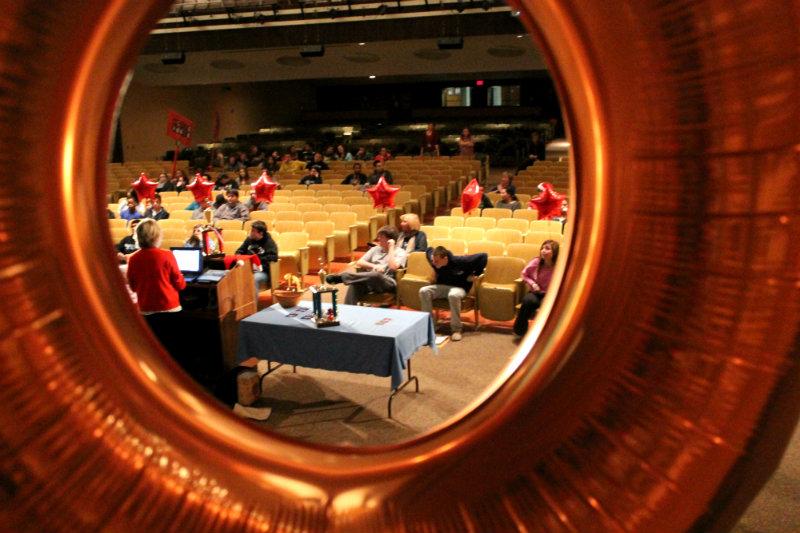TOWAMENCIN – Dazzled by the golden gleam of the Vocab Bowl balloons and glittering trophies of past years’ winners, seven students and a “celebrity guest” ranging from Principal Burton T. Hynes to Santa Claus himself all contemplate the meanings of words like “officious” versus “ominous”. Each competes to win the honor of the team challenge title for his or her English class, and while Mrs. Ellen McKee runs the contest and Mr. Kevin Manero emcees, the contestants must choose one vocab word out of four options based on context clues.
This is North Penn’s Seventh Annual Vocab Bowl, an event whose game show-like atmosphere and close-knit English Department community have made it an affectionately-regarded tradition among the juniors who participate. This year’s competition proved a close one, but in the end Mrs. McKee’s and Mrs. Poole’s third period classes came out on top.
With motivating pop music still blaring in the background, the Bowl transitioned to an individual competition in which contestants named synonyms for vocab words in a rapid-fire elimination which ultimately crowned junior Dez Brown the victor. Later upon finding that his English class had won the team challenge as well, he cited teamwork and the help of his team’s teachers for the win.
“It’s really good because it’s something fun to do before break,” said Brown. “It was fun because I won the challenge, and because I know my words by heart – because of Mrs. McKee and Mrs. Poole. It’s all about teamwork. It’s a very good thing, it does help us study…I know that a lot of other people that had trouble with the words; they did study and they ended up doing really well. It worked out in the end and that’s why we won, because of everybody’s hard work.”
But competition was not all that was in store for the Bowl participants: the holiday spirit of giving was in full force as Manero handed out Wawa and Subway gift cards to students who answered trivia questions correctly or whose raffle ticket numbers were chosen. Students also had the chance to participate in a dance-off, and the names of many participants made entertaining cameos in the fill-in-the-blank sentences.
McKee, who was quick to jump on board the project and help to turn it into the tradition it is today, loves the event for its appeal to the students and break from everyday classroom activities.
“I always look for something that involves everybody and is fun, because I don’t think we have a lot of fun anymore in high schools with all this high-stakes testing,” said McKee. “So once somebody gave me this technology for this [and] I figured out we had these clickers [for submitting answers], I realized that we had the potential for a really great activity for the kids.”
Beyond the Bowl’s departure from typical classwork, it also serves as vital preparation for the standardized tests looming down the road. “Seven years ago when we had PSSAs for the eleventh grade, we needed something that, in the dead of winter, right before the testing season started, to kind of get kids involved and into the academic world and just a little interested in studying and using their vocab words,” said McKee. Now that PSSAs are no longer administered, the Vocab Bowl serves as equally important test prep for the new Keystone exams, as evidenced by the literature-based Keystone Bonus Questions given periodically throughout the competition.
Adding to the list of a slew of benefits, the Vocab Bowl perhaps most importantly fosters a sense of camaraderie and teamwork in the junior English classes that participate. Students learn to work together to win the bragging rights of being Vocab Bowl champs and, in the process, master their vocabulary.
“My favorite part is the preparation for it in the last three weeks in class, because we work really hard and [the students are] so proud of themselves and so happy,” said McKee. “We have done [everything] possible, and when they see them in writing and they know them, they feel empowered.”
The spirit of teamwork and support for one another is immediately evident at the competition as students shout encouragement for their friends “on the hot seat” and cheer at each other’s success. McKee has always felt this sense of community and values it highly in the educational process.
“It’s a sense of camaraderie when we prepare and how we work as a team…I think that we really build a rapport, and we think if you have a class that you feel that you’re a valued member of, then there’s a bigger buy-in for school – and we need that.”


